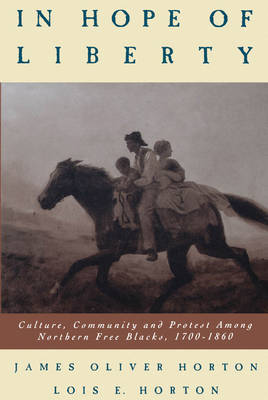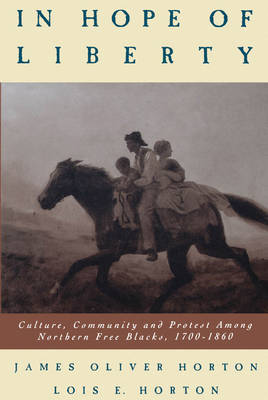
En raison d'une grêve chez bpost, votre commande pourrait être retardée. Vous avez besoin d’un livre rapidement ? Nos magasins vous accueillent à bras ouverts !
- Retrait gratuit dans votre magasin Club
- 7.000.000 titres dans notre catalogue
- Payer en toute sécurité
- Toujours un magasin près de chez vous
En raison de la grêve chez bpost, votre commande pourrait être retardée. Vous avez besoin d’un livre rapidement ? Nos magasins vous accueillent à bras ouverts !
- Retrait gratuit dans votre magasin Club
- 7.000.0000 titres dans notre catalogue
- Payer en toute sécurité
- Toujours un magasin près de chez vous
In Hope of Liberty
Culture, Community and Protest Among Northern Free Blacks, 1700-1860
James Oliver Horton, Lois E Horton
Livre broché | Anglais
91,95 €
+ 183 points
Description
Prince Hall, a black veteran of the American Revolution, was insulted and disappointed but probably not surprised when white officials refused his offer of help. He had volunteered a troop of 700 Boston area blacks to help quell a rebellion of western Massachusetts farmers led by Daniel Shays during the economic turmoil in the uncertain period following independence. Many African Americans had fought for America's liberty and their own in the Revolution, but their place in the new nation was unresolved. As slavery was abolished in the North, free blacks gained greater opportunities, but still faced a long struggle against limits to their freedom, against discrimination, and against southern slavery. The lives of these men and women are vividly described in In Hope of Liberty, spanning the 200 years and eight generations from the colonial slave trade to the Civil War.
In this marvelously peopled history, James and Lois Horton introduce us to a rich cast of characters. There are familiar historical figures such as Crispus Attucks, a leader of the Boston Massacre and one of the first casualties of the American Revolution; Sojourner Truth, former slave and eloquent antislavery and women's rights activist whose own family had been broken by slavery when her son became a wedding present for her owner's daughter; and Prince Whipple, George Washington's aide, easily recognizable in the portrait of Washington crossing the Delaware River. And there are the countless men and women who struggled to lead their daily lives with courage and dignity: Zilpha Elaw, a visionary revivalist who preached before crowds of thousands; David James Peck, the first black to graduate from an American medical school in 1848; Paul Cuffe, a successful seafaring merchant who became an ardent supporter of the black African colonization movement; and Nancy Prince, at eighteen the effective head of a scattered household of four siblings, each boarded in different homes, who at twenty-five was formally presented to the Russian court.
In a seamless narrative weaving together all these stories and more, the Hortons describe the complex networks, both formal and informal, that made up free black society, from the black churches, which provided a sense of community and served as a training ground for black leaders and political action, to the countless newspapers which spoke eloquently of their aspirations for blacks and played an active role in the antislavery movement, to the informal networks which allowed far-flung families to maintain contact, and which provided support and aid to needy members of the free black community and to fugitives from the South. Finally, they describe the vital role of the black family, the cornerstone of this variegated and tightly knit community
In Hope of Liberty brilliantly illuminates the free black communities of the antebellum North as they struggled to reconcile conflicting cultural identities and to work for social change in an atmosphere of racial injustice. As the black community today still struggles with many of the same problems, this insightful history reminds us how far we have come, and how far we have yet to go.
In this marvelously peopled history, James and Lois Horton introduce us to a rich cast of characters. There are familiar historical figures such as Crispus Attucks, a leader of the Boston Massacre and one of the first casualties of the American Revolution; Sojourner Truth, former slave and eloquent antislavery and women's rights activist whose own family had been broken by slavery when her son became a wedding present for her owner's daughter; and Prince Whipple, George Washington's aide, easily recognizable in the portrait of Washington crossing the Delaware River. And there are the countless men and women who struggled to lead their daily lives with courage and dignity: Zilpha Elaw, a visionary revivalist who preached before crowds of thousands; David James Peck, the first black to graduate from an American medical school in 1848; Paul Cuffe, a successful seafaring merchant who became an ardent supporter of the black African colonization movement; and Nancy Prince, at eighteen the effective head of a scattered household of four siblings, each boarded in different homes, who at twenty-five was formally presented to the Russian court.
In a seamless narrative weaving together all these stories and more, the Hortons describe the complex networks, both formal and informal, that made up free black society, from the black churches, which provided a sense of community and served as a training ground for black leaders and political action, to the countless newspapers which spoke eloquently of their aspirations for blacks and played an active role in the antislavery movement, to the informal networks which allowed far-flung families to maintain contact, and which provided support and aid to needy members of the free black community and to fugitives from the South. Finally, they describe the vital role of the black family, the cornerstone of this variegated and tightly knit community
In Hope of Liberty brilliantly illuminates the free black communities of the antebellum North as they struggled to reconcile conflicting cultural identities and to work for social change in an atmosphere of racial injustice. As the black community today still struggles with many of the same problems, this insightful history reminds us how far we have come, and how far we have yet to go.
Spécifications
Parties prenantes
- Auteur(s) :
- Editeur:
Contenu
- Nombre de pages :
- 352
- Langue:
- Anglais
Caractéristiques
- EAN:
- 9780195124651
- Date de parution :
- 30-04-98
- Format:
- Livre broché
- Format numérique:
- Trade paperback (VS)
- Dimensions :
- 157 mm x 234 mm
- Poids :
- 503 g

Les avis
Nous publions uniquement les avis qui respectent les conditions requises. Consultez nos conditions pour les avis.






